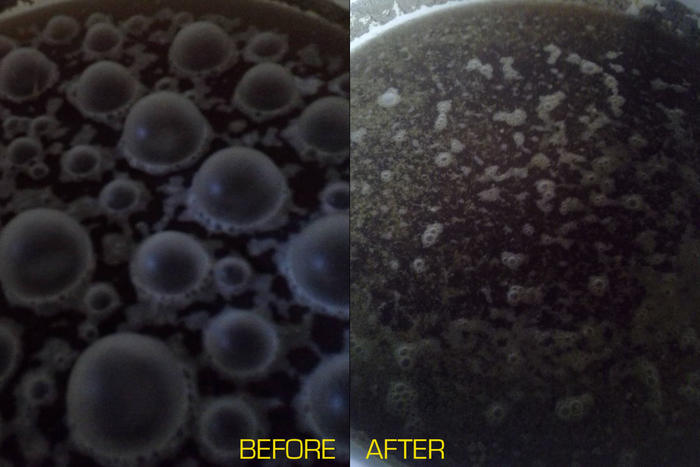jekeane
Well-Known Member
are you using a fermentation chamber? I would start there, then move to where you store your buckets. Your racking cane and hose would have certainly come in contact with all the buckets as well.

are you using a fermentation chamber? I would start there, then move to where you store your buckets.
are you using a fermentation chamber? I would start there, then move to where you store your buckets. Your racking cane and hose would have certainly come in contact with all the buckets as well.
Well... I'm done for a while until I get some glass carboys, think I'm going to make the switch over to glass and hopefully it will help with this issue. My saison hasn't been opened until just today and it had the infection so something is in the buckets or air ?
if those fermentors had been glass you could still have found 2 infected beers. the fermentor material has very little to do with getting an infection. it kind of feels intuitive to get rid of all of the gear for new stuff but it is no guarantee.










Are you using a counterflow or plate chiller?
I was reading that plastic is more susceptible to infections and once it's in it's very hard to remove.
Immersion chiller... I spray it with starsan before using when using the SS hop spider or boil 15-20 mins when not.
Not sure if it's typical but the infection seems to come on after reg fermentation. I did move the buckets but no more than I have done in the past with no ill effects.
this is not true. on these forums you will find tons of infections in glass carboys and stainless conicals. a thread like this can go on for a long time and the exact cause of an infection not be found just through guesses. good sanitation practices will avoid these issues regardless the fermentor material.
Let's try this, let's run through your entire process of sanitization, cooling, etc, include info like where you are storing the beer, what is nearby and all that sort of info. I've already found one immediate flaw with your sanitization process, starsan (and most/all no rinse sanitizers) require you to immerse your equipment in it for at least one full minute (read the instructions and you'll see exactly what I'm talking about); anything less means you haven't properly sanitized your equipment. A quick spray of sanitizer won't work well enough, nor will a boil.
yea i defiantly wouldn't keep grain in my fermentation bucket.
I have a very good spray bottle, it's coats it completely and then some and I'm not shy about using it? I do soak when kegging. so...
Grain, fermenters, equipment in the same room in basement... I crush same area as well. All grain is in buckets with gamma lids. The only thing I leave outside is the keggle and IC.
Process:
1. Fill alum turkey fryer with mash water
2. crush grain in fermenter bucket
3. add water to tun, then grain, stir etc...
4. Fill alum turkey fryer with sparge water and wait 60 mins, drain tun
5. add sparge water
6. take bucket outside and pour into keggle, usually 2+ gallons
7. drain tun again... take outside pour, bring to boil. Usually keep stove in garage just behind the garage door in case I need to close it.
8. add hops, etc... 60 mins.
9. 15 mins before finish, spray off IC and get it ready... add ice/water to bucket for first coil feeding to the IC. Wash and spray out bucket with starsan. Spray hose from keggle to bucket with starsan. Starsan off lid and airlock in basement. starsan what my yeast is in, either starter flask or sometimes I pitch right from collected jars from previous brews.
9. remove SS hop spider
10. add IC, turn on water hose, cool to 65...
11. carry down to basement, spray lid again, spoon (if using slurry) and yeast container, add yeast, cover with lid... add little crushed campden into airlock, add distilled water into airlock after.
12. let it sit for 2-3 weeks
13. spray off lid, hands, arms, etc... open check if all good close... if I do a gravity reading spray inside and out of the thief then put into bucket then put lid back on... usually drink what's in thief and dump rest if any... clean and then starsan it when done.
14. 4-10 weeks when keg kicks on keezer I fill keg with starsan, shake, spray off auto siphon in and out, and siphon a bit back into keg. Usually that's by the dryer which is in another room. Empty keg of starsan.
15. get bucket of beer, put on top of dryer and siphon it into the keg.
16. put keg into keezer, co2 on check for leaks... etc....
17. starsan spoon, mason jars and lids, usually 2 quarts... spoon yeast into jars, close lids, put into fridge.
18. green scrub out the bucket, siphon, airlock, lid, etc clean, spray in/out with starsan, put upside down on ground and couple days put it back on shelf until next time.
My usual process ha...
how long have you been milling grain into your fermentation buckets?
I know that there is a general conception out there that equipment that has come into contact with infected beer is contaminated, but I am not so sure. I think proper cleaning should be sufficient. I had an apple cider go south on me with some unknown, unidentifiable, non-gunk-forming bug and I merely cleaned with Oxyfree and I was good to go. Never had a problem since.
Also, keep the brett infected ESB! Historically these pub beers were riddled with the stuff (also unintentionally). Brett itself merely adds a subtle tartness, not really that mouth puckering sour that you might be thinking of.

I've been spraying for the last 30 beers why is it surfacing now?